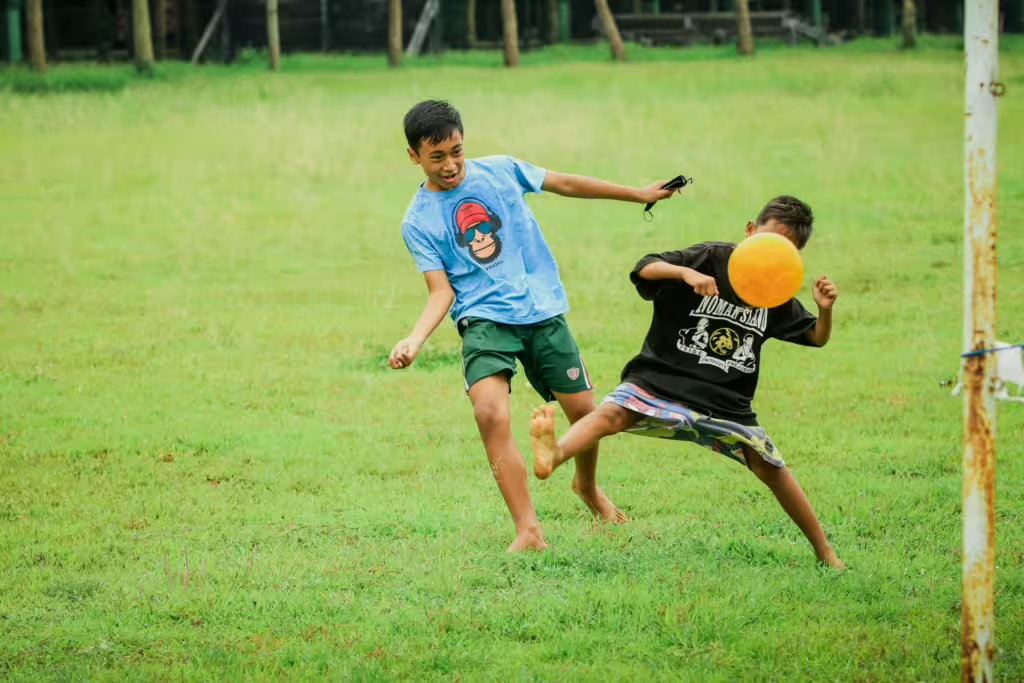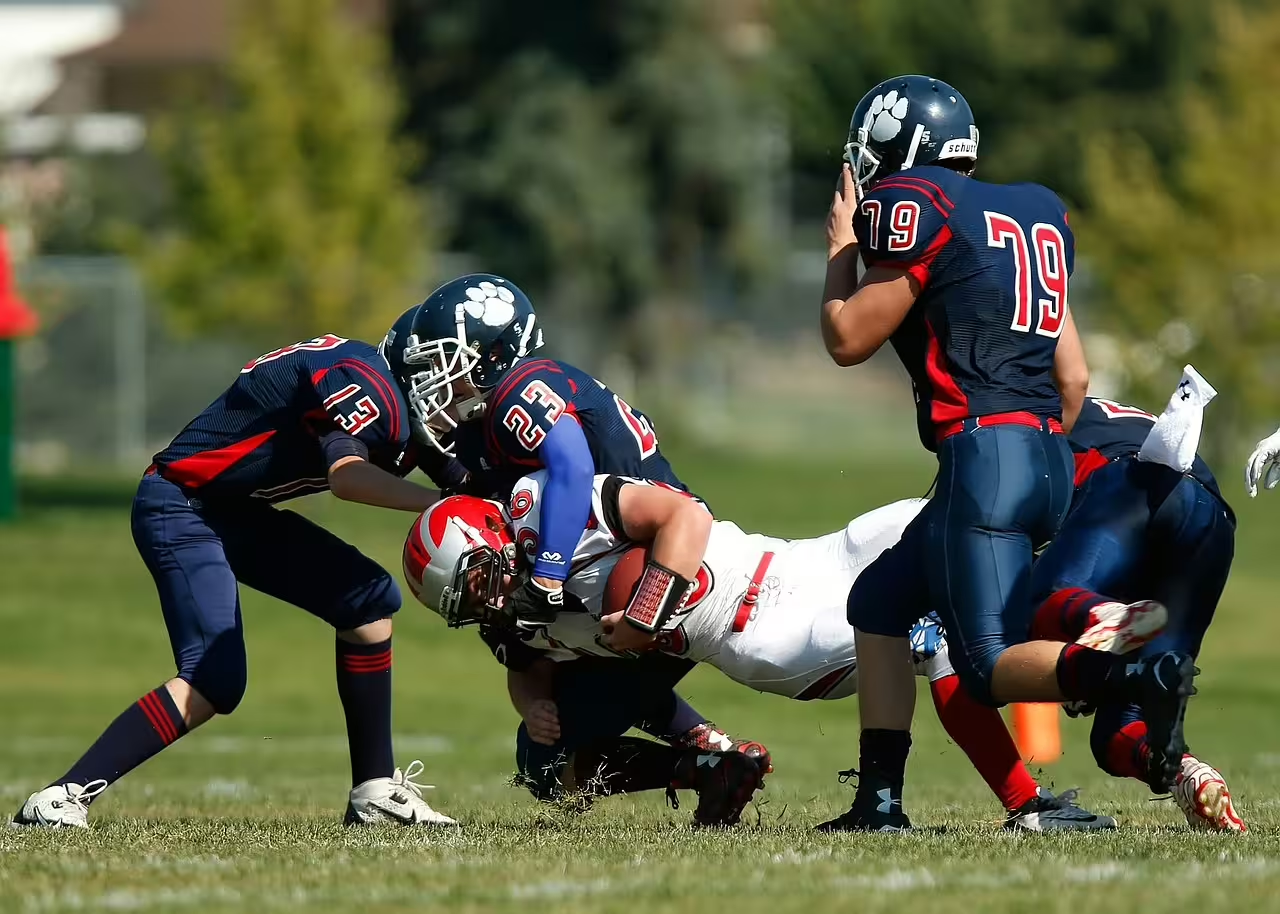Sports play a significant role in the lives of young athletes. From a very young age, kids are introduced to the idea of organized sports. They are drawn into the joy and triumph that accompanies wins from their favorite teams. They cheer for their favorite players and learn what fandom really means. Popular sports entertainment offers children a pretty grandiose expectation of what it means to be a professional athlete. Once they start playing sports for themselves, however, they find a slightly different experience awaits them.
Organized sports offer children multitudinous opportunities for physical activity, teamwork, and personal growth. However, through all this excitement and expectation, one of the most essential aspects of participating in sports is often overlooked: having fun. Fun isn’t just an added bonus of the sports experience, it’s a crucial component. Whether or not a child has fun while playing sports can directly impact their motivation, development, and overall experience.
In this article, we will explore the importance of having fun in sports and try to impart how fundamental that fun really is. Read on to learn how fun contributes to a young athlete’s physical, emotional, and social well-being.
The Foundation of Motivation
A Positive Experience
Children who find joy in playing sports, are more likely to stay engaged and committed to those activities. Fun experiences on the sports field create positive associations with physical activity, which makes kids want to participate more often. Young athletes who enjoy their time on the field, court, or track are more likely to be physically and mentally present for sports. Those kids are more apt to practice regularly, attend games, and seek out additional opportunities to improve their skills.
Reducing Pressure
Pressure is a serious component of organized sports. Too much pressure can lead to mounting stress and anxiety in young children. As kids age up into middle and high school, and that pressure to play at a higher, more competitive level increases, that stress can rise exponentially. In these instances, the child’s focus shifts from enjoyment to performance, forcing young athletes may feel overwhelmed.
If the pressure becomes high enough, burnouts and dropouts can occur, causing young athletes to give up on their sport altogether. To avoid this, parents and coaches should emphasize fun whenever possible. They should endeavor to help young athletes view sports as an enjoyable activity rather than a source of stress. This approach allows young athletes to enjoy the process of learning and growing, which can help bolster long-term success in their chosen sport.
Enhancing Skill Development
Natural Learning Environment
As adults, we seem to have forgotten about the process of fun. We also don’t seem to understand how important fun is to developing skills. Our modern understanding is that when kids are having fun, they are more likely to experiment, take risks, and try new skills. In fact, playful exploration is vital for skill development. For example, a kid who enjoys dribbling a basketball is more likely to practice doing so, This will, in turn, see that child refining their technique over time and will ultimately lead to improved performance in games.
Creative Problem-Solving
When a child is having fun, their brains are working overtime. As a result, fun environments encourage creativity and critical thinking in children. This concept can be seen in team sports, where relaxed and happy players are more likely to think outside the box, make innovative plays, and collaborate effectively with teammates. Creativity like this not only enhances individual skills, it also strengthens team dynamics, thereby fostering a positive and effective learning atmosphere.
Promoting Physical Health
Lifelong Habits
Kids who play sports are generally in better physical shape than those who do not. Children who have positive experiences playing sports are also more likely to lead active lifestyles as they grow older. When sports are fun, socially enriching, or mentally stimulating, kids are more likely to continue participating. This can lead to a lifelong love of physical activity, which, in turn, can foster healthier habits, including regular exercise, balanced nutrition, and overall well-being.
Reducing Health Risks
Childhood obesity is a serious issue and a significant public health concern affecting millions of children worldwide. Over the past several decades, the rates of childhood obesity have skyrocketed, leading to increased health risks in young people. Dangerous health problems such as type 2 diabetes, heart disease, and high blood pressure at earlier ages are a direct result of this obesity and an increasingly sedentary lifestyle greatly contributes to it.
Physical problems in obese children also include potential joint problems, breathing difficulties, and early puberty. Obese children may also struggle with low self-esteem and other emotional issues including anxiety and depression. Fortunately, childhood sports are a great way for concerned parents to nip this problem in the bud.
Children who enjoy physical activities are more likely to choose active play over indulging in screen time. This shift of focus can help kids stay fit and active, whilst promoting better mental wellness and emotional health.
Building Social Skills
Teamwork and Cooperation
With so much of our modern conversations happening from behind a screen, seeking out hobbies that focus on social interaction has become more important than ever before. Many parents might be concerned with the amount of socialization their children are getting in the digital age, and those parents would do well to consider enrolling their child into sports. Organized sports are a fantastic platform for kids to develop their social skills and meet more kids. When children play together, they learn how to communicate, collaborate, and work as a team. Fun activities like sports promote camaraderie and friendships, which are essential for creating a positive social experience.
Conflict Resolution
Teammates are going to disagree sometimes. They might disagree with judgement calls, start a shoving match, or simply get into a shouting argument. The point is, conflicts and disagreements may arise once in a while. However, when fun is the central focus of a sports activity, kids are more likely to approach these situations with a positive mindset. They may try to navigate these moments more respectfully and develop critical problem-solving skills that can serve them well throughout their lives. They may even be able to take these conflict-resolution skills into the workplace with them, or fold them into their other relationships.
Boosting Emotional Well-Being
Building Confidence
Kids who excel in sports are more likely to develop high self-esteem than those who do not. Studies have shown that participation in sports can significantly enhance self-esteem and confidence, especially when the emphasis is on enjoyment. Children who have fun when they are playing are more likely to succeed and feel that sense of accomplishment at a result. This will, in turn, boost their confidence and send them out into the world with a renewed sense of self-assurance. This self-confidence can then extend beyond the world of sports, positively impacting their academic performance and enhancing their social interactions.
Stress Relief
Even kids can feel stress from time to time. Whether it’s a buttload of homework or some schoolyard dispute that’s making them feel badly, stress can impact children in serious and long-lasting ways. Sports might just be one of the easiest ways to answer this. Science tells us that physical activity releases endorphins, chemicals in the brain that promote happiness and well-being. Children who engage in sports can use that experience to escape the everyday stresses that besiege their lives.
Creating Lasting Memories
Cherishing the Experience
Some of our most cherished childhood memories have come from playing sports and games with friends. Even the most curmudgeonly old person can look back fondly upon days playing stickball with their childhood buddies. The laughter and camaraderie found on the sports field create a shared childhood experience that often stands the test of time and memory. These experiences create lasting bonds and positive associations. Kids and adults that look back on these shared enjoyments with fondness will take that feeling with them throughout their lives.
Family Involvement
Sports time can also end up being family time. Children tend to root for the same teams as their parents and often play the same team sports that their parents did in their youth. As such, sports often provide rare opportunities for families to bond and create shared experiences that strengthen family relationships. Parents can facilitate this by doing simple things like attending games or cheering their kids on from the sidelines. In fact, participating in any family sports activity at all can contribute to a positive family dynamic.
Encouraging Diversity in Sports
Exploring New Activities
When the emphasis is on fun, children are more likely to explore a variety of sports activities. They might be willing to try a new martial art or join a soccer team even though neither were originally on their radar. By allowing children the opportunity to try new and fun activities, parents can encourage the discovery of new passions. This process also fosters diversity and might allow young athletes to break down barriers that may currently exist in sports.
Inclusivity and Acceptance
Coaches who cultivate and curate a fun atmosphere in sports are also helping to encourage inclusivity. When children focus on enjoyment, they become more accepting of their peers. They care less about their teammates race, skill level, or upbringing and simply see them as members of their team. Fostering an supportive environment where everyone feels welcome can ultimately lead to a more diverse and vibrant sports community.
Strategies for Parents and Coaches
Foster a Fun Environment
Qs always, parents and coaches play a crucial role in creating an enjoyable environment for young athletes. Read below to find a list of strategies that adults and use to help promote enjoyment in sports:
- Encourage Playfulness: Coaches can incorporate games and fun activities into practices. This can include relays, obstacle courses, or team challenges that emphasize fun over competition.
- Focus on Participation: Winning is important but participation should be key. Coaches and parents should celebrate effort and teamwork rather than just focusing on the scoreboard.
- Positive Reinforcement: Adults should always offer praise and encouragement for effort and improvement, regardless of the outcome. We know that positive reinforcement can help children build confidence and reinforce the joy of playing.
- Listen to Kids: Adults should pay attention to what kids enjoy and allow them to voice their preferences. If a child express interest in trying a new sport or activity, it behooves a parent to support their exploration.
- Organize Social Events: Parents should plan social gatherings or team-building activities outside of regular practices and games. Events like these can help young strengthen friendships and enhance the sense of community within the team.
The Lasting Impact of Fun in Sports
A Foundation for Life
The importance of fun in a child’s life extends beyond childhood. Children learn lessons from the sports they enjoy, and those lessons can have a profound impact on a young person’s life. As parents, we need to push our kids to embrace the fun in life so that they learn to develop a positive mindset. They can then carry that positivity throughout their life and apply it to their academics, relationships, and future careers.
Life Skills
Engaging in sports for enjoyment also helps kids to cultivate important life skills such as resilience, teamwork, and leadership. All of these skills are immensely valuable to creating a well-rounded human being and can be applied to activities and relationships far away from the sports field. Such qualities, empower young athletes to navigate challenges and succeed in their personal and professional lives.
Cultured Athlete Says…
The most important word in all of this is fun. When all is said and done, fun is not just an added bonus to playing sports, it’s an essential part of a young athletes’ overall development and well-being. As parents and coaches, it’s our job to make sure that sports are fun for our children so that we can keep them motivated, develop their skills, cultivate good habits, and create fond memories. Having fun in sports gives children an improved emotional and social mindset and can make them open to new and exciting experiences, sports or otherwise. So let’s help out kids celebrate the spirit of fun in sports and remind them that the journey is just as important as the destination!
Discover more from CulturedAthlete
Subscribe to get the latest posts sent to your email.






